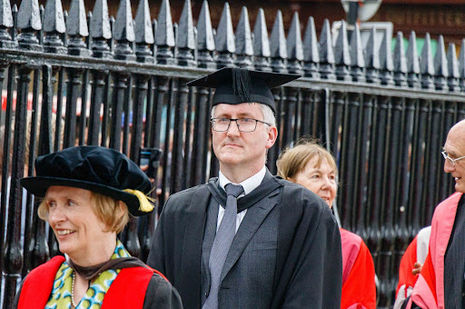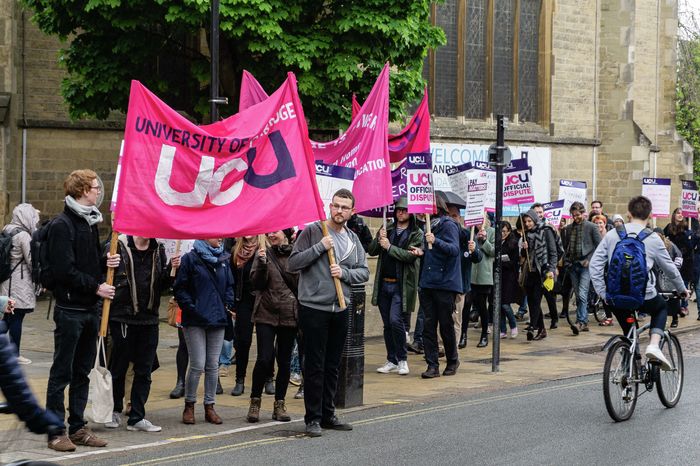‘I’m concerned about the impact strikes will have on students’: An exclusive interview with Graham Virgo
Varsity asks Graham Virgo about strikes, reading week plans and the future of online examinations

Graham Virgo, the Senior Pro-Vice-Chancellor for Education, has been faced with the difficult challenge of mitigating significant disruption to students’ education over the last two years, moving teaching, learning and exams online at the height of the pandemic. But as life at Cambridge has gradually returned to normality in the last term, Virgo remains hopeful in his plans to continue moving the University forward.
Last month (12/10), Virgo told Cambridge Student Union (SU) President Zak Coleman in an interview that he was supportive of the SU’s campaign for a reading week in the middle of term, for which a working group was set up in June. We asked him what progress had been made, and when we might see a vote in the University Council or Regent House on the matter.
He told Varsity that “the working group has prepared a paper that has been circulated to faculties, departments and colleges for an initial institutional response. We will then reflect on those responses and the proposal may be refined and then there will be further engagement and consultation – I have said I would like that to be with the student body, we certainly do not want to exclude the student body. We will be moving forward with that next term. This is a big change and we need to see where the issues are. There are all sorts of practical issues.”
Virgo went on to clarify that the reading week will only be pursued on the grounds that no additional work is set during this week, and that it will be a time for students to catch up on missed work, whilst taking a step back from academic commitments.
Though he was clear that the reading week wouldn't be implemented during the current academic year (2021-22), Virgo “hoped” that the proposal would appear in front of the University Council in this period.
“I would certainly hope so. There would need to be a report prepared which would then be considered by the Regent House, given that it’s such a big change. I’m pushing for the University Council and the college committees to formally consider it this academic year. Let’s see what the responses are, but that is the plan.”
Earlier this month, the results of two University and College Union (UCU) strike ballots were announced, with the Cambridge branch of the UCU voting to strike on both issues: the Four Fights - pensions and pay, unsafe workloads, casualisation and equality failings - and cuts to pension benefits. Strikes will take place from 1st-3rd December, with disruption to faculty-based teaching - but not college-based teaching - inevitable.
After more than sixteen months of disrupted teaching over the course of the pandemic, and four consecutive years of disruption due to strikes beforehand, not to mention discontent amongst striking staff, pressure is mounting on universities to accept the demands of the UCU.
Virgo, however, gave no indication that the demands would be accepted, instead advising students who were concerned about the impact the strikes would have on their education that “advice and support” was available across colleges, faculties and departments.
“I’m concerned about students and the impact on their education, but it is important that we will support students through this.”
Though teaching has largely taken place in person this term, and disruption - from the pandemic at least - has been minimal, it was declared in May that this academic year would be a transition year for Tripos exams, with roughly half of all exams taking place online. When asked if he thought online exams would continue to be used in the future, Virgo commented that he was “aware that a lot of students have embraced the new format.
“We need to consider what works – there seems to be approaching a 50/50 split of those who want to go back to in-person exams, with contingency plans in place if that wasn’t possible and others that want to do something different, building on the online format. There is a lot of reflection that is going on. But we are absolutely coming out of the covid emergency period. We need to ensure that we are reflecting carefully on the experience, what we learnt from the pandemic.
“I’ve been encouraging faculties and departments for a number of years to think about how they examine and whether it is the best way. The knee-jerk assumption that the three hour in-person exam is the only way to examine has changed. If it’s regarded as the most apt way on reflection, fine, but others are thinking we can do something different that’s more apt for our subject. There will be continued consultation on that.
“It does not follow that the way we used to do things [before the pandemic] was necessarily bad, but if we can enhance in-person things with digital tech then we should. We are learning from other institutions around the world, and they’re learning from us.
“I am really proud of the way my colleagues have worked so hard and how deeply we’ve thought about the way we teach and what we teach and making sure it’s the best it can possibly be.”
 News / Judge Business School advisor resigns over Epstein and Andrew links18 February 2026
News / Judge Business School advisor resigns over Epstein and Andrew links18 February 2026 News / Hundreds of Cambridge academics demand vote on fate of vet course20 February 2026
News / Hundreds of Cambridge academics demand vote on fate of vet course20 February 2026 News / Petition demands University reverse decision on vegan menu20 February 2026
News / Petition demands University reverse decision on vegan menu20 February 2026 News / CUCA members attend Reform rally in London20 February 2026
News / CUCA members attend Reform rally in London20 February 2026 News / Caius students fail to pass Pride flag proposal20 February 2026
News / Caius students fail to pass Pride flag proposal20 February 2026











